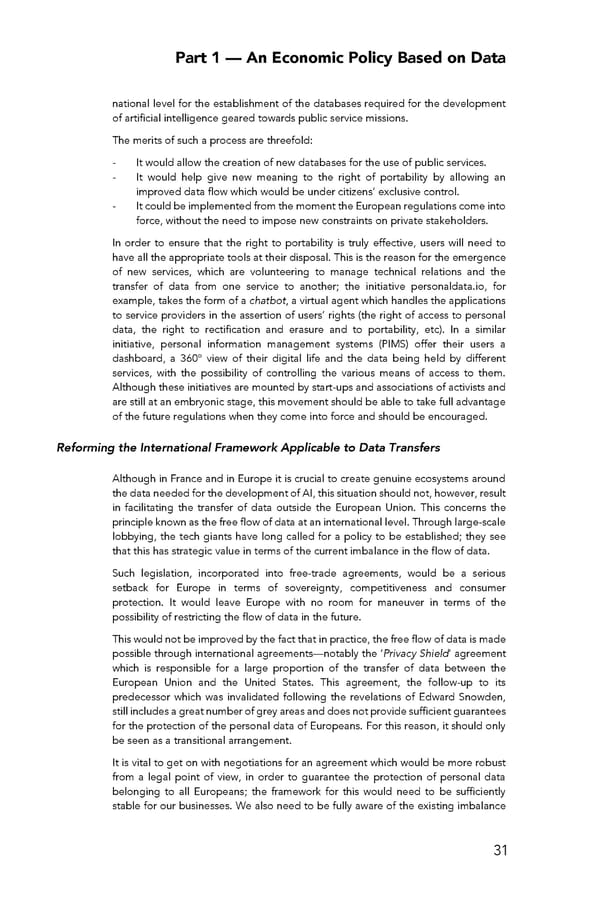Part 1 — An Economic Policy Based on Data national level for the establishment of the databases required for the development of artificial intelligence geared towards public service missions. The merits of such a process are threefold: - It would allow the creation of new databases for the use of public services. - It would help give new meaning to the right of portability by allowing an improved data flow which would be under citizens’ exclusive control. - It could be implemented from the moment the European regulations come into force, without the need to impose new constraints on private stakeholders. In order to ensure that the right to portability is truly effective, users will need to have all the appropriate tools at their disposal. This is the reason for the emergence of new services, which are volunteering to manage technical relations and the transfer of data from one service to another; the initiative personaldata.io, for example, takes the form of a chatbot, a virtual agent which handles the applications to service providers in the assertion of users’ rights (the right of access to personal data, the right to rectification and erasure and to portability, etc). In a similar initiative, personal information management systems (PIMS) offer their users a dashboard, a 360° view of their digital life and the data being held by different services, with the possibility of controlling the various means of access to them. Although these initiatives are mounted by start-ups and associations of activists and are still at an embryonic stage, this movement should be able to take full advantage of the future regulations when they come into force and should be encouraged. Reforming the International Framework Applicable to Data Transfers Although in France and in Europe it is crucial to create genuine ecosystems around the data needed for the development of AI, this situation should not, however, result in facilitating the transfer of data outside the European Union. This concerns the principle known as the free flow of data at an international level. Through large-scale lobbying, the tech giants have long called for a policy to be established; they see that this has strategic value in terms of the current imbalance in the flow of data. Such legislation, incorporated into free-trade agreements, would be a serious setback for Europe in terms of sovereignty, competitiveness and consumer protection. It would leave Europe with no room for maneuver in terms of the possibility of restricting the flow of data in the future. This would not be improved by the fact that in practice, the free flow of data is made possible through international agreements—notably the ‘Privacy Shield’ agreement which is responsible for a large proportion of the transfer of data between the European Union and the United States. This agreement, the follow-up to its predecessor which was invalidated following the revelations of Edward Snowden, still includes a great number of grey areas and does not provide sufficient guarantees for the protection of the personal data of Europeans. For this reason, it should only be seen as a transitional arrangement. It is vital to get on with negotiations for an agreement which would be more robust from a legal point of view, in order to guarantee the protection of personal data belonging to all Europeans; the framework for this would need to be sufficiently stable for our businesses. We also need to be fully aware of the existing imbalance 31
 For a Meaningful AI - Report Page 31 Page 33
For a Meaningful AI - Report Page 31 Page 33